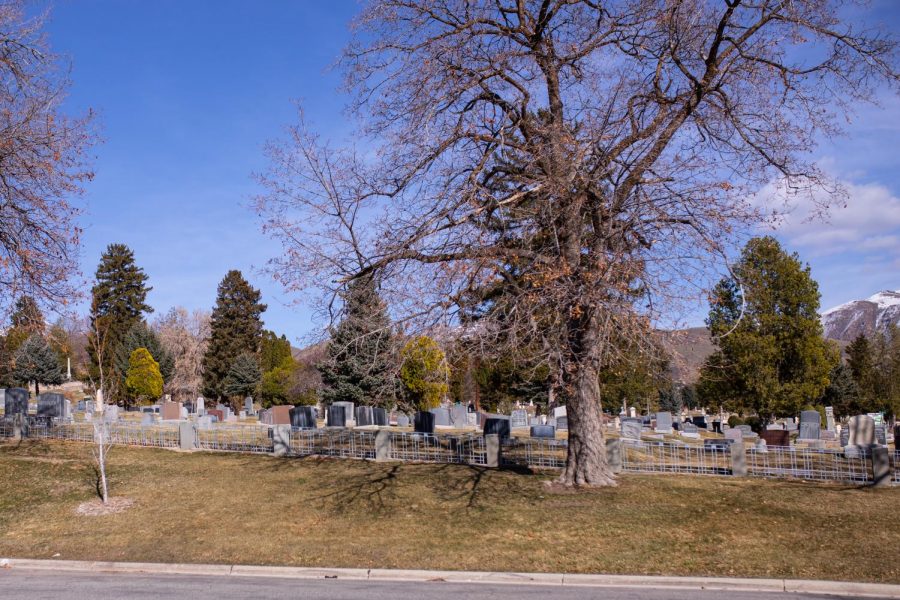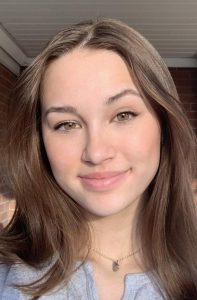Hibben: Remembering Who We’ve Lost in the Pandemic
Salt Lake City Cemetery (Photo by Maya Fraser | The Daily Utah Chronicle)
March 31, 2021
Last week, my 88-year-old grandmother finally received her second dose of the Moderna COVID-19 vaccine. After over a year in isolation, she is overjoyed to be able to see her family and friends, and my stress levels have reduced tremendously knowing that she is much safer than she was just weeks ago. As millions are being vaccinated just like my grandmother, the nation is slowly regaining hope in what has been a gloomy future.
However, the vaccination of one grandparent reminds me of the loss of another. In October, my other grandmother passed away after contracting COVID-19. She was a wonderful, giving woman who oozed elegance. Losing a family member to the virus has been a common experience among many Americans, as over 500,000 people have already died from COVID-19. The month my grandmother died, 95% of COVID-19 deaths were individuals ages 65 and older. So many elderly individuals, already isolated from much of society, were simply added to a growing number of deaths. The nation moved on from these deaths too quickly. Family members were robbed of a proper grieving time and expected to quickly forget their trauma. Now, as vaccine access is expanding and families are being reunited, we need to practice better empathy and finally mourn the loss that most of us have experienced.
Many patients who were hospitalized due to COVID-19 died alone in a hospital room. Thousands died not surrounded by family and warmth, but by strangers dressed in plastic suits. Many of these healthcare workers were already stressed and tired, distracted by the huge weight they had on their shoulders — to take care of patients but also protect their families from the virus. Already distressed patients only had contact with equally distressed individuals. To add to this, elderly members of our society are commonly isolated even without pandemic restrictions, which is a major factor in decreasing health. The often-expected deaths of elderly individuals who contracted COVID-19 had an impact on those patients’ mental strength while trying to recover. Ana Luíza Ramos, a student at the University of Utah, talked about her experience with both of her grandparents slowly recovering from the virus. “A lot of times you’re like, well, you’re the one that’s going to have to live with that grief, but… they’re already grieving because they don’t know if they’re going to get better. And they also know that this might be the last time you talk to them,” she said.
For every person lost to COVID-19, an average of nine family members were left to deal with the sudden shock of losing a loved one and the difficulties of planning a memorial during a pandemic. While the process of losing a loved one is difficult, it’s common to spend time with the family member before their death and be able to find comfort in friends and family after their passing. However, due to COVID-19 regulations, most families’ last memories with their loved ones were over Zoom calls. Cadie Harris, a student at the University of Pittsburgh, spoke about her experience saying goodbye to her great aunt over Zoom. “I think it was just so much harder to deal with that knowing that the grieving process was already kind of messed up… physically to say goodbye was really hard just looking at her over a camera with all these tubes hooked into her,” she said. Even more difficult was the process of planning and attending an online funeral. Frank Adler, a U student who lost his grandmother during the pandemic from causes other than COVID-19, spoke about his personal grieving process. “If she had died two years earlier… we all would have been together… been able to talk to each other, tell stories, and in this case, there wasn’t really a moment like that. And so I think it made the grieving process more solitary,” he said. This inability to say goodbye in person took a proper grieving process away from families and made it almost impossible to have the closure many of us needed.
Perhaps the most unusual part of COVID-19 deaths is the fact that one person’s sickness is dependent on another person spreading the virus to them. Ramos spoke about the added anger she felt in her grieving process. “COVID is different… There’s that whole mentality of, you have someone to blame, you’re going to blame them.” Isolated elderly individuals are often not responsible for their condition, as the virus is sometimes spread to them by family members or friends. Harris talked about her frustration with people’s carelessness during the pandemic that directly contributed to so many deaths. “I knew that it was preventable… It’s like when someone… dies in a drunk driving accident… what happened to that person could have been prevented if people were behaving responsibly,” she said. “I think that’s what gets me is people refuse to think outside of their own discomfort, or, you know, inconvenience of having to wear a mask to the fact that their actions could have very real impacts on the survival of very real people.”
To me, losing an elderly family member during the pandemic was incredibly traumatic compared to previous family losses. Almost immediately, a healthy woman known for her long legs and productivity in the kitchen couldn’t breathe by herself. In the weeks after her passing, I isolated myself, feeling alone and unable to even hug family members.
Tens of thousands of elderly individuals, though at the end of their lives, could have lived longer if they had not contracted the virus. Just because someone is at higher risk doesn’t mean their life is any less shocking or important. Now that the pandemic is finally losing momentum, it’s time to reflect on those we’ve lost and make plans to support each other after so much isolation.








